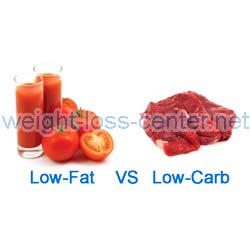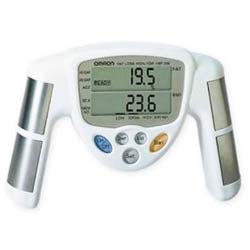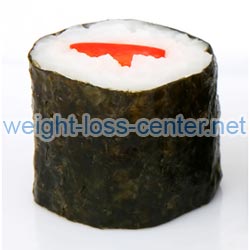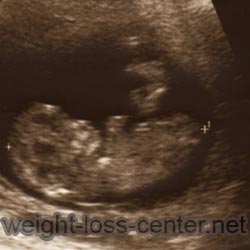|
|
Though the most common reasons that the majority of us will gain weight has to do with consuming too much food, eating the wrong types of foods, or living a lifestyle that is simply too sedentary, there is another significant contributor to weight gain that is often overlooked – water retention. Water retention occurs when water is held within the abdomen or circulatory system, or inside other body tissues and cavities. Though water retention is a normal process of the body – something that every person experiences – when it occurs to more extreme degrees, it can cause us to gain in size and weight.
 It may seem backwards, but drinking 8 or more glasses of water a day helps to prevent water retention. A normal healthy body will always have some level of water retention. In fact, the body requires it for its organs and muscles in order to properly function. The muscles and organs of the body are, essentially, water-filled tissues. However, when certain changes occur in the hydration systems of the body, the result can be a much greater retention of fluids within the body’s tissues, causing swelling within them. When this happens to more extreme degrees, the body rounds out, looking heavier and weighing more.
There are many different causes of water retention that will all result in weight gain to some extent or another. Among the most common is a change within the body’s smallest blood vessels, called capillaries. Capillaries are responsible for ensuring that blood reaches into all of the different parts of the body, so that oxygen, nutrients, and fluids are effectively distributed. Should the capillary walls leak and/or if the blood pressure should change, excessive amounts of fluid can be delivered and stored within various parts of the body where they would not usually occur in such quantities.
As strange as it may sound, dehydration is also a significant contributor to water retention in the body. If you are not drinking enough water, the body detects that it is not receiving sufficient hydration. Therefore, it makes an effort to conserve as much water as it can in this time of “drought”, by storing any additional water within the body’s tissues.
Another culprit of weight gain caused by water retention is eating too much sodium (salt) in your diet. Have you ever gone out to a movie and enjoyed a bag of popcorn only to weight 5 pounds heavier the next day? Most of this weight gain is due to your body retaining water because of the salt you have consumed.
It is not entirely uncommon for a person retaining water to gain up to five pounds in water weight alone, either overnight or over a period of a couple days. This can make it not only challenging to fit into one’s clothes, but it can also make regular weight loss quite a struggle, since the tissues are holding onto so much extra fluid – not fat. The good news is that water weight gain is also one of the easiest to lose and you should notice a drop in body weight when you make some simple adjustments.
In order to help your body to combat water retention, make sure that you’re always drinking at least eight 8-ounce glasses of water every day. Urinate whenever you feel the urge – that is, don’t “hold it”. Try to keep your sodium levels down, as salt is a direct contributor to the retention of water.
Keep in mind that water retention can also be indicative of kidney problems. Therefore, if you are suddenly or abnormally retaining water, it is a good idea to speak with your doctor to ensure that it is not a sign of a more serious problem.
Other Related Posts and Articles you May Find Interesting: “Water and Weight Loss”, “Drinking Water is Important for Weight Loss and Health”, “Top Reasons Why You Cannot Lose Weight” and “How Dehydration Affects Metabolism”.
When I first began dieting I really wasn’t sure how to do it properly, so I tried a number of structured diets such as the Atkins Diet and the Cabbage Soup Diet. Although I would start out losing a small amount of weight on these diets, for one reason or another the weight loss results in the end were dismal. It was only when I started following my own diet that focused on nutrition and calorie-control that I really started to see consistent results. My own diet is not necessarily low-fat or low-carb – instead it focuses on eating healthy foods all in moderation.
 Low-carb and moderate-fat diets appear to be the best for losing weight. Many people who are new to dieting wonder which type of diet is more effective for losing weight – low-fat or low-carb. With so many types of diet out there promoting themselves as the best ones for weight loss, answering this question has been tricky. However, a research study was published recently within the New England Journal of Medicine which compared different kinds of popular diets to try to determine which one is, after all, the safest, healthiest, and most effective diet program. Many elements were considered including speed and ease of weight loss, nutrition, and additional factors such as changes in cholesterol values and long term maintenance of weight loss goals. This study was unique in that it considered the impact of these diets over a span of two years, something never before accomplished.
There were three hundred and twenty two participants in the study. The majority (eighty six percent) of them were male. They allowed for the recording of three different points regarding their health and weight loss when on different diets considered by the study.
The study compared a low-fat diet, a moderate-fat diet, and a low-carb diet. The results of the study showed that the low-carb and moderate-fat diets were the most effective for weight loss overall. Though the low-carb diet did generate the most weight loss overall, the results were extremely close to the moderate-fat diet, so the benefits of that program should also not be ignored.
In terms of overall health and cholesterol values, the low-carb diet caused the most favorable changes. Triglycerides were down while HDL levels were up. This, combined with the most lowered weight lead to the highest health benefits among the studied diets.
It is important to note, though, that low-carb diets aren’t all the same. This study did not follow the standard Atkins-style diet because that leans extremely heavily toward eating meats. Instead, the study chose a reduced carbohydrate diet that allowed for lower carb consumption with a higher number of proteins, but those proteins could also come from non-meat sources such as beans. For the sake of the overall health element of the diet, participants in the low-carb diet were encouraged to consume lean meats and to eat them only occasionally, receiving their proteins from vegetarian, plant-based sources instead.
When comparing the results between men and women, there was an interesting difference in that the most weight loss occurred among the women on the moderate-fat diet instead of the low-carb diet. That being said, the low-carb group still lost a large amount of weight. Cholesterol level changes remained the same among men and women depending on the diet they used. What was most surprising about this study was that the low-fat diet – that which had traditionally been the most popular – consistently performed the most poorly.
When choosing the right diet for you, there is something even more important to consider than whether the diet is low-carb or low-fat. The right diet for you will be one that you can incorporate into your life and stick with. Even though a low-carb diet may in theory be the best choice for losing weight, if the diet you choose is too restrictive or difficult then you are going to have a hard time staying with it. This is one thing I learned when first starting out dieting myself. So before you dedicate yourself, emotionally and financially, to following a certain diet make sure it is one you will be able to incorporate into your lifestyle and will suit your personal tastes.
Other Related Posts and Articles you May Find Interesting: “Low Carb Diets”, “Eco-Atkins Diet”, and “Carb Fat Protein Ratio in a Healthy Weight Loss Diet”.
There is an increasing concern among doctors and scientists about the link which is being continually reaffirmed between obesity and the occurrence of breast cancer. There has been significant statistical data gathered to show that women who hold their excessive body fat in their abdomens and upper bodies are much more likely to have breast cancer at some point in their lives. Though conclusive evidence has not yet been gathered as this would require an exceptionally long-term study, there is more than enough evidence to show that there is a trend linking obesity to the instance of breast cancer.
 Preliminary research indicates that being overweight or obese raises the incidence of breast cancer in women. It is believed that an explanation for this occurrence has to do with the additional xenoestrogen levels that exist within the additional fat cells in bodies of women who are overweight and obese. Xenostrogens can be very hazardous as they are well known contributors to the development of cancerous tumors, specifically around the area of breast tissues. The greater the amount of xenestrogens throughout the fatty tissues, the larger your odds are to experience the growth of a cancerous tumor. Therefore, it is mainly believed that breast cancer is a result of hormonal activities throughout the body.
For example, immediately before or after menopause, it is common for weight gain to occur. In those individuals who experience this increase in body mass, the risk of breast cancer also increases. It is at this time in a woman’s life that her ovaries no longer produce estrogen, which is generated within a woman’s body fats. When the transition into menopause begins and the woman already has too much fat on her body, there will be a buildup of additional estrogen throughout the time after menopause has occurred. This additional fat-based estrogen, it is believed, can cause a heightened breast cancer risk.
This being said, there are some rare cases where obesity actually has the ability to reduce a person’s risk of developing breast cancer. This is only in the case where the obesity has altered the woman’s menstrual cycle so dramatically that ovulation is limited. Since ovulation doesn’t occur as frequently or regularly, the release of estrogen and progesterone as well as estradiol are lower, also lowering the risk of breast cancer. This is, though, only in very limited cases.
The trouble with the breast cancer that develops as a result of obesity is that it is typically the most debilitating and dangerous form, called inflammatory breast cancer, where the cancer cells plug the lymph vessels, causing the breast tissues to swell. When compared to leaner women, obese women experience inflammatory breast cancer much more frequently.
Due to the possible link between breast cancer and obesity, it becomes even more important to maintain a healthy lifestyle for women, especially for those in or past menopause. By keeping excess fat from your chest and abdomen areas, you will not only lower your chances of certain types of cancer, but you will avoid other health conditions, such as back pain, associated with this type of weight gain.
Other Related Posts and Articles you May Find Interesting: “Menopause Diet – Best Foods for Menopause”, “Healthy Weight Loss Diet May Prevent Cancer”, “Alcohol Affects Risks of Cancer and Heart Disease in Women” and “Anti-Cancer Diet”.
When it comes to losing weight, it is possible to do it on your own, but there are many gadgets available that can make things much easier for you along the way – especially in terms of remaining active and tracking your progress effectively. Weight loss is a huge industry, and companies from around the world have worked hard to develop different tools to benefit you in a realistic and practical way. Naturally, not all products are created equal – especially when it comes to the weight loss industry – but when you can find the right ones to help you out, you won’t need to spend very much money, but you will find that you’re seeing a large difference along the way.
 There are a number of weight loss gadgets, such as a body fat monitor shown here, that can help you along your way while losing weight. Pedometers – Pedometers are little devices that you attach to your clothing and that will tell you how many steps you’ve taken on a walk, a hike, or even throughout the day. If you’re hoping that walking will be a contributor to your activity level to assist in weight loss, then you’ll want to make sure that you’re taking enough steps every day to make it count. Weight loss research has shown that it takes around 10,000 steps every day to help you to lose weight. Of course, without a pedometer, it would be rather challenging to be able to count all those steps to make sure you’ve taken enough. To find out how accurate a pedometer is, test them in the store. Clip them to your clothing, take twenty five normal steps (count along in your head), and see which devices have recorded this accurately. Be careful to make sure that you’re not getting a device that is so sensitive that it records other body movements (such as standing up or sitting down) as a step. Some pedometers also come with a feature that estimates the number of calories you’ve burned through the steps you’ve taken. Though this is not necessarily perfectly accurate or required, it can be handy for motivational purposes.
Calorie Trackers – To better understand how many calories you’re consuming in a day, calorie trackers can be quite handy. They allow you to record the calories from everything you eat throughout a day. This way, you can start to learn whether you need to cut back on the types of foods you’re eating, learn portion control, or understand your diet in other ways. There are a plethora of calorie trackers that you can use for free online or you can purchase calorie tracker software for your personal computer.
Fat Loss Monitors – These little devices are held in your hand and send out a tiny electrical current to let you know how much (in percentage form) of your body is fat. This helps to let you know where you stand in terms of body fat levels. Some bathroom scales also have this feature built in. Fat loss monitors can be particularly helpful for keeping you motivated while dieting. As we all know, losing pounds can be a finicky beast and stubborn weight loss is very frustrating. This monitor will help you see whether your body fat percentage is dropping even if the numbers on the scale aren’t.
Weight Loss Video Games – Today, there are several different kinds of video games and game consoles designed to help you to become more active while having fun at the same time. For an affordable price, you can play many games and sports all from the comfort of your own living room. One of the best is EA Active for the Wii, as well as Wii Fit. There are also weight loss tracking programs for popular gaming systems, such as Nintendo DS’s “My Weight Loss Coach” that make keeping track of your weight loss progress easier and more fun. (For more information about these types of games, read the post “Video Games that Help You Lose Weight“.)
Scale – Of course, there is no more direct way to monitor your body weight than a good quality bathroom scale. If you want to track your weight accurately, a digital scale would be better than the old-school spinning dial ones. You can also buy scales that have a body fat monitor built in so that you can monitor your fat loss.
When it comes to weight loss gadgets, there are so many to choose from, but in my experience these 5 are the most useful. If you use a weight loss gadget and just couldn’t do without it, please share. Since Christmas is just around the corner, all of us dieters out here will want to put together our wish lists, and a weight loss gadget that will help us get motivated about losing weight in the new year may be just the ticket.
Other Related Posts and Articles you May Find Interesting: “Tips for Working Out at Home”, “Weight Loss by Mobile Phone” and “Weight Loss Book Reviews”.
Most people trying to lose weight have incorporated more physical activity into their lives. Be it going to the gym, walking the dog in the evenings, or Sweatin’ to the Oldies in the privacy of our living rooms, one thing is for sure – getting our bodies moving is an important part of shedding those pesky pounds.
 Daily activities we do, such as grocery shopping, house cleaning and even playing a musical instrument can contribute to our overall NEAT weight loss. Although NEAT (non-exercise activity thermogenesis) weight loss won’t get you off the hook for getting some decent exercise, it is an interesting and rather new concept in the battle with the bulge. NEAT is the term used to describe the activities we do on a daily basis that do not include eating, sleeping or planed exercises (I.E. aerobics, going to the gym, etc.). For instance, examples of NEAT could be: walking to work, engaging in yard work, house cleaning, washing dishes, typing, and even fidgeting. What most of us do not realize is that these trivial physical activities actually increase our body’s metabolic rate considerably. Therefore, you can actually lose weight by simply engaging in NEAT.
Studies have found that some individuals have higher NEAT than others and this is mostly due to the type of job and lifestyle they lead. For instance, manual and agricultural workers have high NEAT, while those who work in an office or have sedentary jobs have lower NEAT. This seems like common sense. Furthermore, other studies have discovered that NEAT adjusts with changes that occur in the amount of food we eat, suggesting that NEAT may play a major role in how a person maintains their body weight, gains or loses weight or becomes obese.
Anyone who is interested in achieving NEAT weight loss needs to understand how this can occur. To do this one needs to consider their total daily energy expenditure (EE). Your EE consists of your basal metabolic rate (energy that is used when laying down at total rest), the thermic effect of food (energy that is required for digestion) and active energy expenditure (the energy that is necessary to move your body). This active energy, also known as activity thermogenesis, includes both organized physical activity as well non-planned activities like standing, walking or sitting. The non-planned activities are, or course, NEAT (try this great tool to calculate your own daily NEAT – Activity Calorie Calculator).
You may be wondering how engaging in simple regular movements can help you lose weight. The fact of the matter is that anytime you do anything that requires your muscles to contract you need energy to do it. Understand, this doesn’t mean sitting at a desk all day or fidgeting can be considered adequate exercise. Therefore, you still need to make sure that you are getting regular exercise (preferable both anaerobic and aerobic exercises) and eating a healthy diet. In fact, the healthier your habits become the better chance your NEAT will naturally increase.
As I have mentioned a number of times, it is not necessarily the activity you are doing, but the fact that you are doing some activity at all, that will determine whether you lose weight or not. One of my favorite activites to break a sweat doing is housework – especially these days because of the pregnancy. Although it may not get my heart pumping the way intervals at the track or a good jog does, it still counts as activity and is a perfect example of NEAT. Taking the stairs at work instead of the elevator, walking to the store to buy groceries, gardening and so on can all contribute to your overall NEAT weight loss. Embracing NEAT weight loss in your life is all about finding the little opportunities to be active.
Other Related Posts and Articles you May Find Interesting: “Fun Exercises that can Help You Lose Weight”, “Exercises You Can Do While Sitting” and “Exercises You Can Do At Work”.
We’ve always known that having a healthy body weight is important for overall good health, but did you know that it is just as important for your mind and intelligence as it is for your body and the prevention of physical illnesses? This is because of the lifestyle elements involved in reducing weight and maintaining an ideal body weight are the same ones for increasing your brain smarts.
 Key elements of weight loss, such as a healthy diet and exercise, also improve brain function. To start, exercise – a key element to keeping proper body weight or losing additional weight – is vital for increasing brain power. This is made very clear when you compare the test results of children who have exercised previous to their examinations and experienced cognition spikes after acute aerobic exercise. After a bout of moderate exercise for around thirty minutes in adults, brain function and speed and accuracy of thought will increase by between five and ten percent.
Furthermore, when you’re eating a healthy, nutritious diet, you’ll be receiving the nutrients you need for your brain to run at its best levels. There are, in fact, specific “brain foods” and categories of foods that can make a great difference to cognitive ability, and many of these are natural elements to be included in the diets of individuals who are following a sensible weight loss diet.
Some examples of brain foods that also help with weight loss include:
- Red cabbage – This food is not only high in nutrients and fiber (very important to weight loss), but it also contains anthocyanins which are important for increasing the functioning of the brain.
- Good fats – Healthy fats from some oils, meats, and dairy allow for better acetylcholine production in the brain, which is vital to neural integrity (allowing for better communication among regions of the brain and the nervous system) as well as for the formation of memories. Omega-3 fatty acids are among the best fats for brain health and can be found in oily fish such as salmon, rainbow trout, sardines, haddock, and shrimp.
- Tomatoes – Tomatoes contain lycopene, which helps to neutralize free radicals since they are antioxidants. As free radicals can be damaging to brain cells, antioxidants are key to eliminating that problem and ensuring the health of the brain. Carnitine production is also stimulated by the nutrients in tomatoes, allowing for faster fat burning in the body.
- Ginger – Fresh ginger acts as a tremendous anti-inflammatory so that it can not only help with digestion for more effective weight loss, but it can also help to prevent mental illnesses such as Parkinson’s disease and Alzheimer’s. Furthermore, it promotes proper functioning and health of the brain.
- Berries – Berries, either fresh or frozen, are an excellent source of antioxidants. In particular, blueberries are king in this category, but cherries, raspberries, blackberries and strawberries are also excellent. Not only do antioxidants help relieve “oxidative stress” in the brain, but they may also help to increase the rate at which you lose weight (for more information, see the article “How Antioxidants Enhance Weight Loss”).
- Eggs – Not only are eggs an excellent source of protein that will help curb hunger, but they are rich in a brain-building nutrient called choline.
- Sardines – Really, sardines! If you’ve spent some time learning about ways to lose weight then you’ve probably come across the Sardine Diet (see our Review here “Is there something Fishy about the Sardine Diet?”). As it turns out though, eating these little fish not only helps you lose weight, but assists in maintaining brain function throughout your life.
- Cocoa – Cocoa, which is the source of the best food on the earth, chocolate, contains the nutrient flavonol that increases blood flow to the brain and improves brain function. Combine this with cocoa’s ability to suppress appetite and you’ve got a win, win here (for more information, see the article “Chocolate Increases Weight Loss”).
So as you can see, the actual weight of your body doesn’t dictate your brain smarts, but what you eat and how you exercise can. Since eating a healthy, well-balanced diet and getting regular exercise (including aerobic exercise) are essential aspects of losing weight, it can be said that yes, losing weight can make you smarter. Of course, all of us dieters out there all ready know this :).
Recent studies are showing that enzymes, such as protease, lipase and bromelain, may play an important role in weight loss. This has brought about an interesting holistic approach to weight loss that combines the use of enzyme supplements, vitamins and minerals, herbs and other homeopathies for helping people shed stubborn weight. Although I am not convinced that being overweight or obese can be completely explained by a lack of enzymes, focusing on ways to increase enzymes with improvements in diet can be very beneficial for someone who is trying to lose weight.
 Eating raw foods provides your body with natural food enzymes that improve digestion. To begin to understand how enzymes may improve weight loss we need to go back to high school biology class for a moment (half of us just fell asleep…lol). Enzymes are, essentially, catalysts. What this means is that they help make chemical reactions go faster (kind of like adding dish soap (the catalyst) to your backyard slip ‘n slide). In the digestive system you can then imagine how important enzymes are for increasing the rate at which our bodies break down fats, proteins and other components of the foods we eat, otherwise known as metabolism. In fact, every metabolic reaction is started, maintained and ended by enzymes. Without enzymes we would have no metabolism at all.
There are three types of enzymes: digestive enzymes, food enzymes and metabolic enzymes. The two groups that are considered “weight loss enzymes” are digestive enzymes and food enzymes and their sole role is to breakdown the food we eat. Digestive enzymes are produced by our bodies, whereas food enzymes are present in the raw foods that we eat. Did you catch that? Yes, raw foods, and raw foods only. When you heat food, vegetables or meat, the natural food enzymes are broken down and rendered useless. So unless your diet includes consuming a large amount of raw foods then your body has to work overtime to produce digestive enzymes to pick up the slack. What this ultimately means is that the more your digestion relies on digestive enzymes to break down food, the more stress you put on your body’s systems and organs and the less time they have for rebuilding and replacing worn out and damaged cells and tissue and keeping the immune system strong.
OK, so now that we understand enzymes a bit and see how they can make us healthier or unhealthier as the case may be, let’s look at how they can affect weight loss. In terms of weight loss, the right enzyme supplements may make a large difference when combined with your other efforts. If you’re already eating a healthy diet that includes at least a couple servings of raw fruits and vegetables at each meal, and if you’ve incorporated daily exercise into your routine as well, then the enzymes can make all the difference to getting the extra weight off your body. For one thing, you’ll be a great deal healthier, meaning that your body’s systems will be running at their best and your immune system will be strong, but also it will mean that your metabolism will run at a higher level so that you’ll burn more and store fewer of the calories that you ingest.
There are three primary types of digestive enzymes responsible for breaking down the foods we eat: protease, lipase and amylase. Protease, as the name suggests, is the enzyme that is responsible for breaking down protein. Protease also helps the body to rid itself of toxins. Both of these functions are critical to ensuring that the body runs properly and can lose weight as effectively as possible and that you get the maximum nutritional benefit from the proteins that you eat. Lipase is an enzyme that can be found in many raw foods and is responsible for helping the body burn fat and process it into useable energy. This enzyme is lacking in the diets of many people who do not eat enough fresh raw vegetables. Thus, eating a better balanced diet can help to increase levels of lipase so that you can digest fats better and have an easier time losing weight. Finally, amylase is the enzyme responsible for breaking down carbohydrates.
When I first read about food and digestive enzymes I was confused how they can help one to lose weight because I figured if my body broke down fats and carbohydrates more efficiently then I would gain weight instead of losing. However, after doing more reading on the subject I see how backwards this thinking may be. What food and digestive enzymes do is help your body reap the most nutritional benefit from the foods you eat. Thus, your body will receive all the energy, vitamins, minerals, fats and sugars it needs from a minimal amount of food. However, if your diet lacks foods that naturally contain these enzymes your meals will have less nutritional value for your body. In this situation, your body becomes nutritionally depleted and your brain signals you to eat more food in an attempt to correct this problem. And around and around the cycle goes with you having to eat more and more to meet your body’s basic nutritional requirements.
Exploring how food and digestive enzymes may improve weight loss was a very interesting experience. Although I don’t think they are the be all, end all answer for losing weight I am sure they do play a role and much more research should be conducted in this field. If you are interested in exploring how these weight loss enzymes may improve your efforts to lose weight then my first suggestion would be to spend more time in the fruit and vegetable section of your grocery store. Try to eat at least two servings of raw fruits and vegetables a day and see if you notice an improvement in your weight loss. You can also take supplements if you don’t feel that your diet is providing you with a sufficient amount of these enzymes however don’t just go out and buy some to take without first consulting with your doctor, nutritionist or homeopath to find out the correct path for you.
Other Related Posts and Articles you May Find Interesting: “Losing Weight on a Raw Food Diet“, “Foods that Boost Metabolism“, “Digestive Benefits of Papaya” and “Eating Ginger Promotes Weight Loss“.
Recently there has been a great amount of attention focused on the impact that weight loss and weight loss surgery can have on obesity-related sleep apnea. Sleep apnea, which is characterized by pauses in breathing during sleep, can cause a number of difficulties including poor sleep from frequently waking up, loud snoring, headaches and weight gain (see the article “Sleep Apnea and Weight Gain” for more information). Although sleep apnea does not only affect people who are overweight or obese, it appears that these people are more inclined to suffer from this condition.
 The severity of sleep apnea, a potentially life-threatening sleep disorder, can be successfully reduced with weight loss. The most common type of sleep apnea is called obstructive sleep apnea, or OSA. Although in many cases the symptoms of OSA, such as loud snoring, restless sleep, and sleepiness during the day, are not life-threatening, people who suffer from severe OSA are at risk of developing a type of congestive heart failure called cor pulmonale. It is also estimated that people who suffer from sleep apnea have a 30% higher risk of heart attack or premature death.
It is estimated that 95% of people who suffer from sleep apnea are overweight or obese. It is no surprise then that the most common and successful treatment for obstructive sleep apnea is weight loss. Both weight loss by conventional methods, such as a calorie-restricted diet and exercise, and by weight loss surgery have shown to drastically reduce the symptoms of sleep apnea in overweight and obese patients.
The fact that a number of studies have found that weight loss may cure sleep apnea is positive news for people who suffer from this condition. Of all the methods for treating sleep apnea, weight loss and making other positive lifestyle changes, such as quitting smoking and getting more exercise, have the most dramatic effects. People who also undergo weight loss surgery typically have a noticeable improvement in their sleep apnea symptoms.
If you are a loud snorer or your partner keeps you up at night with their nasal serenades, you may want to explore whether you have any of the other signs of sleep apnea. Snoring, even really loud snoring does not necessarily mean a person has sleep apnea, but it is often one of the easiest symptoms to diagnose. If you suspect you may be suffering from sleep apnea, make an appointment with your doctor for a check up. Your doctor will likely arrange for you to take a test called a polysomnography, which is a painless test that monitors your respiration rate, blood oxygen levels and other factors while you sleep. Often this test can be done overnight in the comfort of your own bed at home.
There is no doubt that losing weight has numerous positive impacts on your overall health, and improvements in sleep apnea are yet another good reason to shed those extra pounds. Being overweight or obese is not always the cause of sleep apnea, but studies support that losing weight will go a far way to improving this potentially life-threatening condition. If you would like to read some of these studies on your own, here is a couple to peruse:
Other Related Posts and Articles you May Find Interesting: “Restless Leg Syndrome” and “Sleep and Weight Loss“.
I feel terribly neglectful that I have not been posting as regularly as I usually do. There has been so many exciting things going on in my life that blogging has taken a bit of a back seat, but I am hoping to turn that around. Every day I see new comments to the posts I’ve written from people who have questions or have found them helpful. This motivates me to keep blogging about weight loss even if my own goals in this area are having to change.
 I find there are two key similarities between weight loss and pregnancy - a healthy diet and regular exercise are extremely important. Here is a picture of my little one at 11 weeks, 5 days. You may notice that it has been many weeks now since I have posted my weekly weigh in, which is something I did diligently for about 6 months. The reason I stopped weighing myself weekly is because six weeks ago I found out I was pregnant. My husband and I wanted to wait to tell our family, but now that they all know I think it is safe to make the announcement public. My first trimester will be over in a couple of days. Needless to say, I am thrilled beyond belief, but I am also scared about how pregnancy will make me gain weight. I have been thinking about this a lot and have come to the conclusion that weight loss and pregnancy do not mix. The bottom line is that I have to stop being so concerned about my weight as it appears as a number on a scale and just focus on eating a healthy diet and getting regular exercise.
I have done some reading up about how many calories a developing fetus consumes during a day and I was really surprised how few it really is – about 300 calories. When women are pregnant the common misconception is that they are “eating for two”. Really, the truth is that you only need to increase your calorie intake by about 300 calories a day. When you begin breast feeding this goes up to about 500 calories a day. With this in mind, I have been very conscious about not going crazy thinking that I can eat whatever I want. Although my goal is not to lose weight over the next 6 months, I do intend to keep my weight gain to a healthy and reasonable level.
I am really grateful now that I have learned so much about food and nutrition over the past year and a half. This knowledge is coming in really helpful because eating a healthy and balanced diet is more important than ever when pregnant. Because of all the changes I made to my diet over the past year, such as limiting refined sugars and fats, I am already following the diet that my doctors recommend for a healthy pregnancy. The only small problems I have run into are dealing with nausea and severe food aversions. Tomatoes, salad greens, mozzarella cheese and all meat are completely off the menu. I have found many wonderful protein alternatives to meat, however, and wonder if I really need to eat meat at all.
As for exercise, I have really been trying to get some every day, but jogging and high intensity cardio are out. I tried to go for a jog a few days ago and had sharp pains from my stretched ligaments in my stomach so I had to stop. Not to mention that my chest area has doubled in size and it’s an uncomfortable feeling to have those things banging around so much. Goodness knows how Pamela Anderson did it on Bay Watch :). Every day I do get out for at least a 30 minute brisk walk, rain or shine. I have also been throwing myself into work around the house – trying to get everything organized because I know this will be the last chance I have to do this for the next few years. It’s amazing how good a workout housework can be.
So here is my update and I hope you will all forgive me for not posting sooner. I promise to keep blogging about weight loss because despite being pregnant it is still a topic I am interested in and want to know about. Not only that, but in a years time I will be needing all the knowledge I have to lose post-pregnancy weight (hopefully not too much though). In the meantime, if there are any parents out there who want to share their own insites about weight loss, pregnancy, or both, please, please do. I have so much to learn and need all the inspiration I can get.
Other Related Posts and Articles you May Find Interesting: “The Risks Obesity Poses to Pregnancy“, “PMS Increases Metabolism and Weight Loss“, and “Health Conditions that Cause Weight Gain“.
Even though I am turning into quite the diet diva, I admit I still like my sweets. Whenever I read of new artificial sweeteners my interest is definitely peaked. I first read about Zerose in a health magazine. Although I haven’t tried this product yet, it looks promising as a healthier sugar-substitute. On the official Zerose website there are also some recipe suggestions using this new zero-calorie sweetener, including Zerose Cheesecake, Zerose Strawberry Smoothie and Zerose Granola. It’s definitely worth a try.
 Zerose is a relatively new artificial sweetener that contains zero calories, is organic and Kosher certified. Zerose sweetener is the latest in zero-calorie sweeteners, and is a brand name used by Cargill for erythritol. This chemical is different from other no calorie sweeteners because it is the only natural polyol sugar alternative that does not have any calories. Technically, it has already been eaten by humans for thousands of years as it is found in many kinds of fruits as well as mushrooms and foods such as soy sauce, wine, and some cheeses. Currently it is utilized in the production of reduced-calorie foods and beverages in addition to some tabletop products.
The benefits of Zerose are that it does not contain any calories, it is naturally derived, it is compatible with a diabetic diet, it doesn’t lead to tooth decay, and it is even Kosher certified. Though it is not as sweet as sugar itself, it is a very pleasant tasting sweetener choice for individuals who require a diet for diabetes or who are looking for a sweet alternative to sugar that will allow them to enjoy the flavor without a large caloric intake.
Erythritol has been created since 1990. It is formed through the process of fermentation and then added in bulk to many different products to sweeten them without increasing their calorie count. Typically, it is made by fermenting corn, sugar beets, or wheat. The carbohydrate from the vegetable is then mixed with water and a natural culture to ferment. It is a similar process to the method that is used to turn milk into yogurt. The result is then filtered and crystallized and allowed to dry so that the end product has a purity of a minimum of 99.5 percent.
The chemical has been approved of by many countries and is recognize as safe for consumption. Since 1990, it has been permitted for use in Japan and achieved this same right in the United States in 2000. Canada and the European Union have also both given their approval for the sweetener since 2004.
It is important, though, to know that relying on artificial zero-calorie sweeteners is not a solution to efforts to lose weight. Though they can be beneficial in some circumstances, it is much more effective to simply adopt a healthier lifestyle, including a nutritious diet and regular exercise. Studies have continually shown that using no-cal or low-cal sweeteners don’t necessarily have any impact on weight loss, so it is typically recommended that if the original product has too many calories, it should simply be avoided altogether or eaten in much smaller portions, instead of replacing it with a lower calorie version.
Despite the research, for myself, if I am given the opportunity to indulge a bit in a sweet treat that is prepared with a zero-calorie sweetener then life is good.
Other Related Posts and Articles you May Find Interesting: “Stevia Sugar-Substitute: A Healthy Artificial Sweetener”, “Zero Calorie Food Flavorings“, “Sensa Review – Will Sensa Help You Lose Weight?” and “Health Effects Caused By Aspartame“.
|
|














